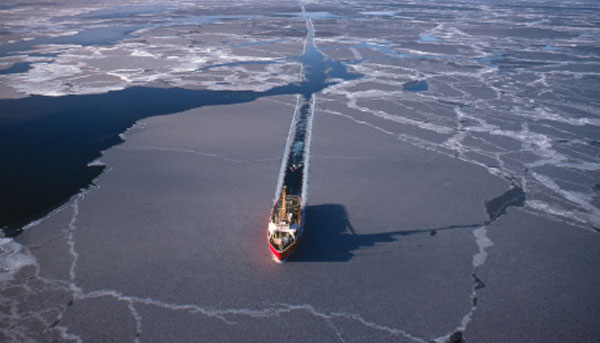- Who Owns the Arctic? Understanding Sovereignty Disputes in the North
- Douglas & McIntyre (2010)
[Editor's note: Last week's Throne Speech pledged "Our Government will also work with other northern countries to settle boundary disagreements." A prime example of that willingness is Canada's recent overture to the U.S. to resolve the two nation'’ territorial dispute over certain oil-rich Arctic seabeds. What's at stake in the fast-melting Arctic, and what strategy should Canada follow there? That is the topic of UBC international law expert Michael Byers' recently published book Who Owns the Arctic?. We've excerpted the conclusion here.]
One clear arctic night in the open waters of Foxe Basin, the crew of the Amundsen turned off the spotlights and sailed by the light of the aurora borealis and the stars. This enabled them to see farther into the distance as they scanned the waters for icebergs.
Standing on the darkened bridge, watching brilliant waves of silver, blue and green play across the heavens, I became acutely aware of our location on the curved surface of a tiny planet in the infinity of space.
Al Gore makes the point very powerfully in An Inconvenient Truth. Earth, with its wondrous balance of atmosphere, water, life and photosynthesis, is all we have. And through our stubborn, short-sighted addiction to fossil fuels, we are throwing that balance away.
The Arctic is in crisis. The ice and the permafrost -- the foundations of its highly specialized ecosystems -- are literally melting away, and with them the traditional way of life of the Inuit. A vast, ice-bound, impenetrable ocean is being transformed into a new Mediterranean Sea, a "middle sea" over which the world's powers will trade. Easier access and rising oil, gas and mineral prices will spark 21st-century gold rushes, challenging the political will and governance capabilities of governments who, for decades, have largely ignored the Arctic.
There is only one way to preserve the North in anything approaching its natural state, and that is to dramatically reduce greenhouse gas emissions in the South. Every Arctic-specific policy imperative, whether on sovereignty, security, shipping or search-and-rescue, is driven by the need to adapt to the increasingly severe consequences of climate change.
Ultimate 'tragedy of the commons'?
Climate change presents the ultimate collective action problem, what Garrett Hardin famously termed "the tragedy of the commons." With hundreds of governments, thousands of stateless transnational corporations and billions of consumers embroiled in a fossil fuel–based economy, opportunities abound for pursuing one's own gain at the expense of the common good. This makes stabilizing the atmosphere the most improbable cooperative exercise ever attempted by humankind. Yet there is no Plan B, no alternative planet to which we can collectively decamp. We simply have to cooperate.
The Arctic is one place to start: a vast, sparsely populated region with only a handful of nation-states; only a few, relatively minor boundary disputes; and a pre-existing framework of universally accepted international rules, centrally including the law of the sea. If humanity cannot cooperate in the Arctic, it cannot cooperate anywhere.
The need for Canadian leadership
Seen from this perspective, Canada's Arctic policies take on global importance. In addition to its domestic responsibility to provide good government within our national boundaries, the Canadian government has a broader, overarching responsibility to pursue every opportunity for international cooperation. That's the only way to save all that we value, including right here at home.
Sovereignty and international cooperation are not incompatible. To the contrary, sovereignty can facilitate cooperation by providing clear jurisdiction for regulating shipping and the extraction of natural resources, and for guarding against non-state security threats. International law results from centuries of inter-state cooperation, as countries have defined the boundaries between their respective jurisdictions and worked together in pursuit of common goals.
Resolving our disputes over Hans Island and the maritime boundary in the Lincoln Sea would set a positive course for Canadian diplomacy in the North and help cement important relationships with both Denmark and Greenland. Engaging the United States with respect to the maritime boundary in the Beaufort Sea would confirm that cooperative trajectory and provide useful elements for a larger compromise over the extended continental shelf. The same kind of proactive engagement is called for regarding the Northwest Passage, before it's too late.
Work with Russia
Canadian politicians have to stop their bellicose rhetoric about Russia's actions, and the ongoing behind-the-scenes cooperation between Ottawa and Moscow should be publicly recognized.
Working with the Russian government to resolve potential overlaps in our extended continental shelf claims, to regulate Arctic shipping and to provide search-and-rescue does not imply approval of that country's human rights record or of its actions in Chechnya and Georgia. In fact, working with Russia will contribute to a larger effort, led by U.S. President Barack Obama, to "push the reset button" on U.S.-Russia (and therefore NATO-Russia) relations. The importance of this contribution cannot be overstated. If Obama is successful in re-engaging Russia, both former antagonists will make deep cuts to their nuclear arsenals, leading to a much safer world for everyone.
The real question
From a purely legal perspective, five countries own parts of the Arctic, Canada prominent among them. In terms of international law, at least, we are an important Arctic nation. But the Arctic is not a box sealed off from the rest of the world. It is a human place, full of connections and emotions, where lives are lived and histories made. It is a laboratory for international cooperation across the historic fault-lines of the Cold War.
And it is a place of critical natural importance, located on the front lines of the greatest crisis ever to have threatened this, our fragile Spaceship Earth.
In the end, the important question isn't "Who owns the Arctic?"
It is instead "Are we, as a country, up to the task?" ![]()
Read more: Politics, Environment
















Tyee Commenting Guidelines
Comments that violate guidelines risk being deleted, and violations may result in a temporary or permanent user ban. Maintain the spirit of good conversation to stay in the discussion.
*Please note The Tyee is not a forum for spreading misinformation about COVID-19, denying its existence or minimizing its risk to public health.
Do:
Do not: